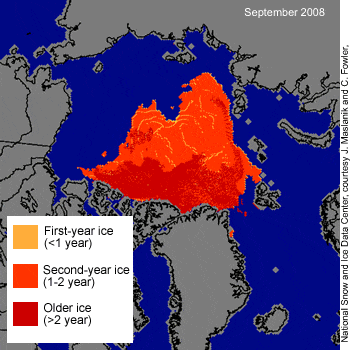Arctic ice has maxed out for the year and is starting its slow melt into summer in much worse shape than normal, according to the National Snow and Ice Data Centre.
If you look only at the extent of Arctic sea ice, things are not as bad as they have been in recent years. Ice cover is five per cent higher this year than in the record low 2006, even if it is four per cent lower than the 1979 to 2000 average.
But ice thickness is another story, and that seems to be all bad news. Normally, this time of year, 30 per cent of the ice covering the Arctic is more than two years old and much, much thicker than ice that has formed in the last one or two years. Such thick, old ice is significantly more likely to survive a summer season.
Thanks to the big summer bust-ups of 2007 and 2008, old ice has been reduced from 30 per cent to just 10 per cent of the total. And if you watch this animation, you’ll see that winter storms and ocean currents have pushed a significant amount of that old ice out of the Arctic and down the east coast of Greenland, where it is destined to break up and disappear in the coming summer.
What’s left behind is a thinner skim of ice that will be more vulnerable than ever to summer temperatures and summer storms.
Go here to find out more details about DeSmogBlog’s monthly book give-away.
Subscribe to our newsletter
Stay up to date with DeSmog news and alerts






